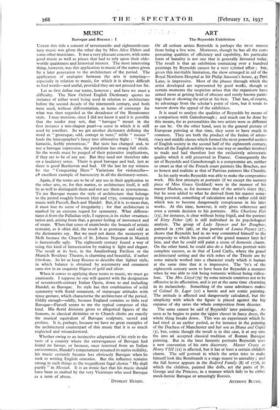MUSIC Baroque and Rococo : I UNDER this title a
concert of seventeenth- and eighteenth-cen- tury music was given the other day by Miss Alice Ehlers and some other musicians. It was a very pleasant concert, with some good music as well as pieces that had to rely upon their olde- worlde quaintness and historical interest. The most interesting thing, however, was this application to music of the names given by a later generation to the architecture of the period. The application of analogies between the arts is tempting— especially in relation to music, for which it is always difficult to find words—and useful, provided they are not pressed too far.
Let us first define our terms, however ; and here we meet a difficulty. The New Oxford English Dictionary quotes no instance of either word being used in relation to architectitre before the second decade of the nineteenth century, and both were used, without differentiation, as terms of contempt for what was then regarded as the decadence of the Renaissance style. I may mention, since I did not know it and it is possible that the reader may not, that " baroque " meant in the first instance a mis-shapen pearl—a sense in which it is still used by jewellers. So we get another dictionary defining the word as " grotesque, odd, corrupt in taste," while " rococo " leads the lexicographer's fancy into alliterative flight : " florid, fantastic, feebly pretentious." But taste has changed and, to use a baroque expression, the pendulum has swung full circle. So the words must be purged of their pejorative implications, if they are to be of any use. But they need not therefore take on a laudatory sense. There is good baroque and bad, just as there is good Beethoven and bad. Of the last let my witness be the " Conquering Hero " Variations for violoncello— al excellent example of barococery in all the dictionary-senses.
Again, if the terms are to be of any use in their application to the other arts, or, for that matter, to architecture itself, it will be as well to distinguish them and not use them as synonymous.
To me BaroqUe means the style of architecture that belongs to the period roughly between 165o and 175o, contemporary in
music with Purcell, Bach and Handel. But, if it is. to mean that,
it must lose its sense of irregularity ; for that architecture is marked by an extreme regard for symmetry. What differen- tiates it from the Palladian style, I suppose, is its richer ornamen- tation and, arising from that, a greater feeling of movement and of strain. When that sense of strain broke the bounds of artistic restraint, as it often did, the result is as grotesque and odd as the dictionaries say. But we need not damn the monastery at Melk because the Church of St. Johann Nepomuk in Munich is fantastically ugly. The eighteenth century found a way of Using this kind of fantastication by making it light and elegant. The result at its best, in the Amalienburg Pavilion or the Munich Residenz Theatre, is charming and beautiful, if rather frivolous. So let us keep Rococo to describe that lighter style, in which balance is obtained by asymmetry and ornament runs riot in an exquisite filigree of gold and silver.
When it comes to applying these terms to music, we must go cautiously. I suppose no one will quarrel with the designation of seventeenth-century Italian Opera, down to and including Handel, as Baroque. Its style has that combination of solid symmetry-with florid ornament, of statuesque attitudes with tense gesture, which characterise the architecture of the period. Oddly enough—oddly, because England contains so little real Baroque—Purcell seems to me the typical composer of this kind. His florid divisions given to allegorical figures of the Seasons, to classical divinities or to Church choirs are exactly the musical equivalent of Baroque sculpture, ' sacred and profane. It is, perhaps, because we have no great examples of the architectural counterpart of this music that it is so much neglected and misunderstood.
- Whether owing to an instinctive adaptation of his style to the taste of a country where the extravagances of Baroque hid foUnd no favour, or because, once removed from an Italian environment, Handel's temperament resumed its native stolidity, his music certainly became less obviously Baroque when he took to writing English oratorios. But the influence reniains strong in such things as the magnificent fugal chorus " He,shall purify " in Messiah. It is an ironic fact that his music "shOtild hive been so exalted by the very .Victorians who used Baroque as a term of abuse.
DYNELFY HUSSEY.'














































 Previous page
Previous page